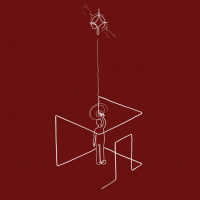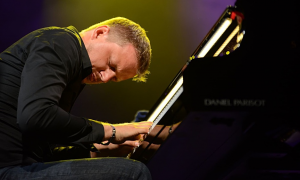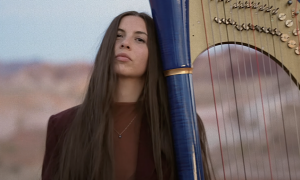Home » Jazz Articles » Interview » Dave Ledbetter: Diversity and Unity
Dave Ledbetter: Diversity and Unity
DL: Some people tell me that it's the one I'll probably be remembered for! My grandparents were salvationists, they were missionaries in China, Kenya, and in India. So I grew up in a kind of Fire-and-Brimstone Calvinist family, a very Christian upbringing. My late grandfather was a missionary in Nairobi, Kenya, during the Second World War. Six weeks after the Japanese invaded Pearl Harbor, he was stung on the forehead by a bee. He was allergic to bees and he died. That was 17 years before I was born, so I never got to meet him. He's buried in Forest Road Cemetery in Nairobi. So I wanted a piece that sounded like a Salvation Army brass band, a funeral march piece, which that piece certainly does. Anyway, a few years ago, Ronan happened to be touring Kenya with Babu, and I said, "Look, can you do me a favor and just go and put a rose quartz crystal on my grandfather's grave," which he did. So I was very thankful for that. We hadn't yet recorded the track, that was a couple of years before we recorded it. So that's the story of "Forest Road."
AAJ: Similarly, another really striking track is "Awagawan." This is in memory of Gito Baloi, correct?
DL: It is. It's a direct translation from the Sanskrit. It means "coming and going." It refers to the cycle of birth and rebirth in the Hindu scriptures. Gito and myself shared a room for a week at the Grahamstown Festival in 1996 or so, and got quite close walking back and forth from the gigs, hanging out and playing music together. Gito was a beautiful person, a very laid-back guy and a wonderful musician. He was friends with so many of the people that I know and have worked with. He was from Maputo, and I work with musicians from Maputo like Jaco Maria, the Paco brothers, and so many amazing Mozambicans. The beginning of the piece came pretty quickly to me, and we did early versions of that live when Ronan and I first started to play together. We didn't play it again for a long time, and then it came back up just before we went over to Europe. So I thought it was time to record it. So we recorded it on the second album.
AAJ: In terms of projects on the horizon, you mentioned a duo with Hein, and you mentioned also that you're going to also be recording yourself in a guitar and voice context. I noticed on YouTube that you had done a little bit of that work with Amanda Tiffin already.
DL: I have just done an album with Amanda and Hein, and also with an amazing pianist and accordion player from Brazil named Guilherme Ribeiro. So we did an album of compositions of mine, Amanda's, Hein's, and Guilherme's. I think it's being mixed as we speak, but I'm not quite sure when it's going to be released. So that will be coming out quite soon. I'll also be going over to Europe, in February next year and recording with a Swedish saxophonist by the name of Per Thornberg. So there's plans to do some stuff there. You've got to keep busy!
AAJ: That's a very wide range of projects, then!
DL: Yes. I think South Africa is extremely diverse in music and there's so many different influences that are all different but yet all the same. You can hear they're from the same place but from different parts of the same place. That's the great thing about South African music. Since 1994, people have been able to get their stuff out there and have it played and heard. It's reached a wider global audience, and long may it continue.
Photo credit: Maya Morgan-Skillen
Selected Discography:
Boereqanga, Made in South Africa, (Nebula Bos Records, 1996)
Dave Ledbetter, Scorpio Rising, (Lions Head Records, 1996)
Deep South, A Waiting Land, (Self Released, 2013)
Deep South, Heartland, (Self Released, 2015)
Tags
Interviews
Seton Hawkins
South Africa
Cape Town
Ronan Skillen
John Lockwood
Kevin Davidson
Mike Campbell
Robbie Jansen
abdullah ibrahim
Bheki Mseleku
Basil Coetzee
Winston Mankunku Ngozi
Johnny Fourie
Bill Evans
Keith Jarrett
Herbie Hancock
Thelonious Monk
Bud Powell
Mary Lou Williams
Jim Hall
Steve Newman
Louis Mhlanga
Guy Buttery
Lee Thompson
Kesivan Naidoo
Shane Cooper
Darren English
Mark Fransman
Hein van de Geyn
Shaun Johannes
Kevin Gibson
Björn Meyer
Gito Baloi
Amanda Tiffin
PREVIOUS / NEXT
Support All About Jazz
 All About Jazz has been a pillar of jazz since 1995, championing it as an art form and, more importantly, supporting the musicians who make it. Our enduring commitment has made "AAJ" one of the most culturally important websites of its kind, read by hundreds of thousands of fans, musicians and industry figures every month.
All About Jazz has been a pillar of jazz since 1995, championing it as an art form and, more importantly, supporting the musicians who make it. Our enduring commitment has made "AAJ" one of the most culturally important websites of its kind, read by hundreds of thousands of fans, musicians and industry figures every month.



























